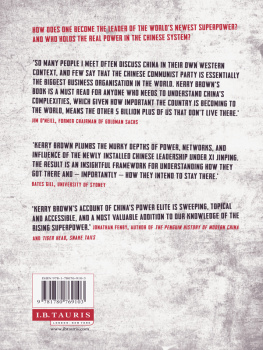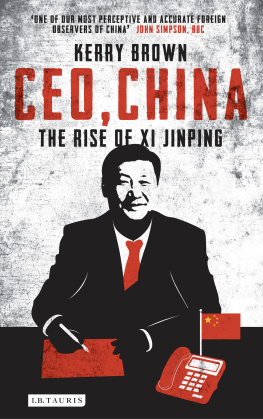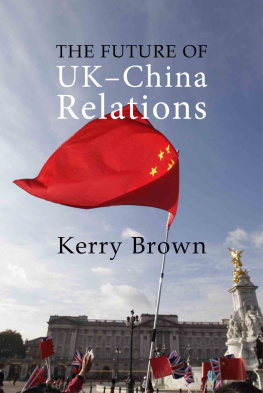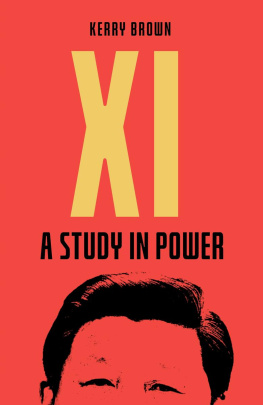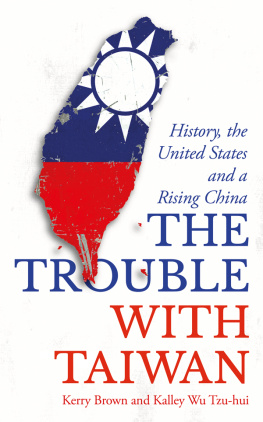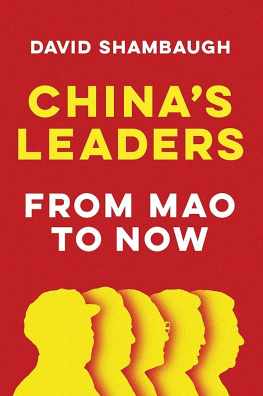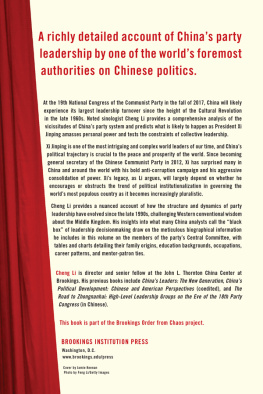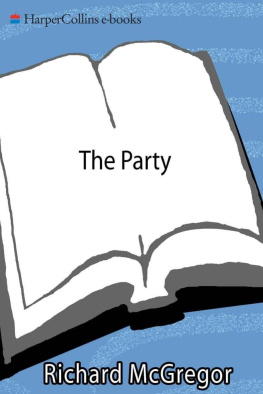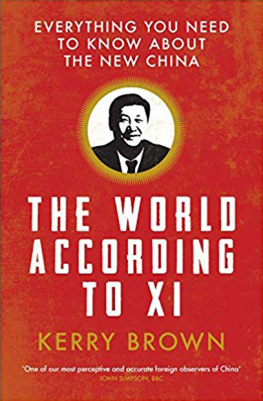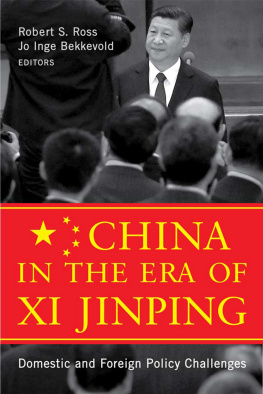KERRY BROWN is the Director of the China Studies Centre at the University of Sydney and former head of the Asia Programme at Chatham House. With 20 years experience of life in China, he has worked in education, business and government, including a term as First Secretary at the British Embassy in Beijing. He is the author of Contemporary China (2013), Friends and Enemies: The Past, Present and Future of the Communist Party of China (with Will Hutton, 2009) and Struggling Giant: China in the 21st Century (with Jonathan Fenby, 2007).
So many people I meet often discuss China in their own Western context, and few say that the Chinese Communist Party is essentially the biggest business organisation in the world. Kerry Browns book is a must read for anyone who needs to understand Chinas complexities, which given how important the country is becoming to the world, means the other 5 billion plus of us that dont live there.
Jim ONeill, former chairman of Goldman Sachs
Kerry Brown plumbs the murky depths of power, networks, and influence of the newly installed Chinese leadership under Xi Jinping. The result is an insightful framework for understanding how they got there and importantly how they intend to stay there.
Bates Gill, University of Sydney
Kerry Browns account of Chinas power elite is sweeping, topical and accessible, and a most valuable addition to our knowledge of the rising superpower.
Jonathan Fenby, author of The Penguin History of Modern China and Tiger Head, Snake Tails
THE NEW
EMPERORS
POWER AND THE PRINCELINGS IN CHINA
KERRY BROWN

Published in 2014 by I.B.Tauris & Co. Ltd
6 Salem Road, London W2 4BU
175 Fifth Avenue, New York NY 10010
www.ibtauris.com
Distributed in the United States and Canada
Exclusively by Palgrave Macmillan
175 Fifth Avenue, New York NY 10010
Copyright 2014 Kerry Brown
The right of Kerry Brown to be identified as the author of this work has been asserted by him in accordance with the Copyright, Designs and Patents Act 1988.
All rights reserved. Except for brief quotations in a review, this book, or any part thereof, may not be reproduced, stored in or introduced into a retrieval system, or transmitted, in any form or by any means, electronic, mechanical, photocopying, recording or otherwise, without the prior written permission of the publisher.
ISBN: 978 1 78076 910 3
eISBN: 978 0 85773 383 2
A full CIP record for this book is available from the British Library
A full CIP record is available from the Library of Congress
Library of Congress Catalog Card Number: available
Typeset by Out of House Publishing
Dedicated to my colleagues at the China Studies Centre at Sydney University, and to the Vice Chancellor, Dr Michael Spence
ACKNOWLEDGEMENTS
I am grateful for the assistance of Xin Zhao (Caroline Xin) for selection of Chinese language material and for research assistance for this book, to Tzu-hui Wu for work on the bibliography, and to Dr Shi Li for comments on the first chapter. My thanks also go to Tomasz Hoskins at I.B.Tauris for commissioning and giving support and feedback with his team, and to Robert Whitelock for copy-editing the manuscript.
ABBREVIATIONS
CCDI | Central Commission for Discipline Inspection |
CCTV | China Central Television |
CIC | China Investment Corporation |
CPC | Communist Party of China |
CPPCC | Chinese Peoples Political Consultative Conference |
CR | Cultural Revolution |
CYL | China Youth League |
DPRK | Democratic Peoples Republic of Korea |
DRC | Development and Reform Commission |
GDP | gross domestic product |
PLA | Peoples Liberation Army |
PRC | Peoples Republic of China |
RMB | Renminbi |
SARS | Severe Acute Respiratory Syndrome |
SEZ | Special Economic Zone |
SOE | State-owned enterprise |
TVE | Town and Village Enterprise |
WTO | World Trade Organization |
INTRODUCTION: THE NETWORKED LEADERSHIP
On the night of 14 November 2011, Neil Heywood a British businessman and consultant, resident in China for over a decade was staying in the Lucky Holiday Hotel, a fading three-star residence in the suburbs of Chongqing, a province-ranked city in south-western China. He was there, according to documents issued by Chinese authorities later in 2012, at the behest of Gu Kailai (sometimes called Bogu Kailai), wife of the most powerful man in the city, Communist Party Secretary Bo Xilai. Heywood reportedly had an association with the Bo family going back to his time when he was resident in Dalian in the north-east of China earlier in the decade.
According to the official Chinese news agency, Xinhua, which reported at the trial of Gu Kailai nine months later in Hefei, Anhui province, some time on the evening of 14 November Gu poisoned Heywood. During the trial, Gu testified that Heywood had threatened the personal safety of her son and decided to kill [him]. To me, she was reported as saying, that was more than a threat. It was real action that was taking place. I must fight with my death to stop the craziness of Neil Heywood.
The report continued with the direct testimony of the man who it was claimed had been her accomplice, Zhang Xiaojun, a member of her security detail:
On Nov. 12, 2012, Bogu Kailai asked me to contact Neil Heywood, saying that she wants to meet him and I shall pick
Zhang stated that at 9 p.m. in the evening of the next day, after Heywood had taken the two-hour flight from Beijing to Chongqing, Bogu Kailai went to the Lucky Holiday Hotel with drinks. She took these to Heywoods room, Zhang waiting outside until Kailai summoned him a little later that evening, commanding him to bring prepared cyanide in a glass container. This she personally administered to the British man, who was by that time so drunk he was vomiting copiously. She then told hotel waiters to leave the guest alone in Room No 1605, after hanging the Do Not Disturb sign on the door when she left, according to testimony of a hotel waiter. There Heywoods body lay until hotel personnel finally forced the door down and found him, spread on the bed, two days later.
The August trial of Gu resulted in her admission of full guilt, along with her claimed accomplice, and a suspended death sentence. But the trial also raised a whole series of questions, some of them relating to the murder, and others relating to the very function and exercise of power in contemporary China. The reason that Heywoods tragic fate, and the whole set of circumstances around Gus involvement and the final trial, mattered was their link to the political ambitions of one of the most ambitious and talented politicians of his generation in modern China, Bo Xilai. The simple fact was that the trial occurred at a moment in Bos life when he had the chance to reach the summit of power the Standing Committee of the Politburo of the Communist Party of China (CPC). His wifes activities were the first in a series of events that were to cause this to unravel, and for him to end up felled
Next page
